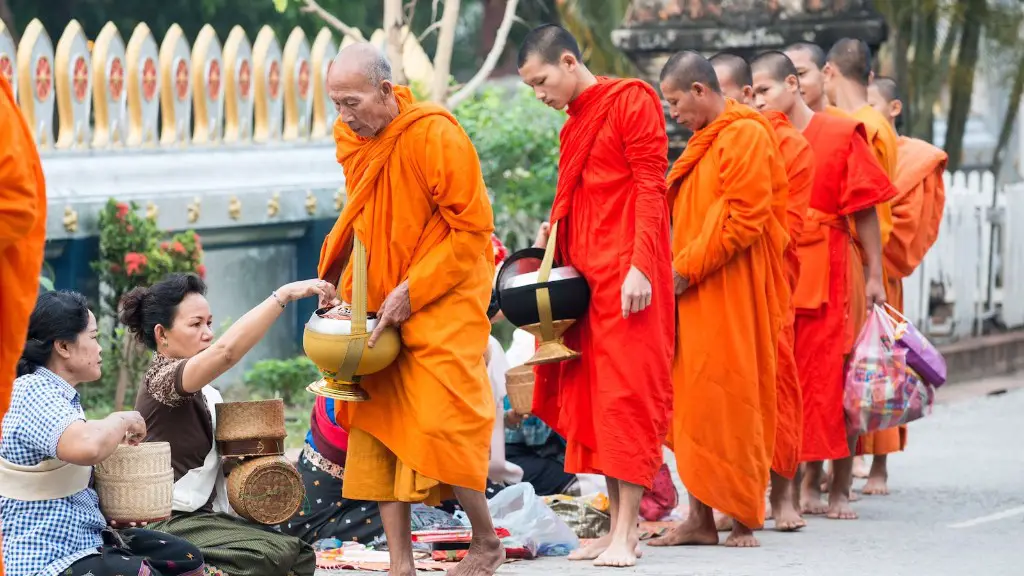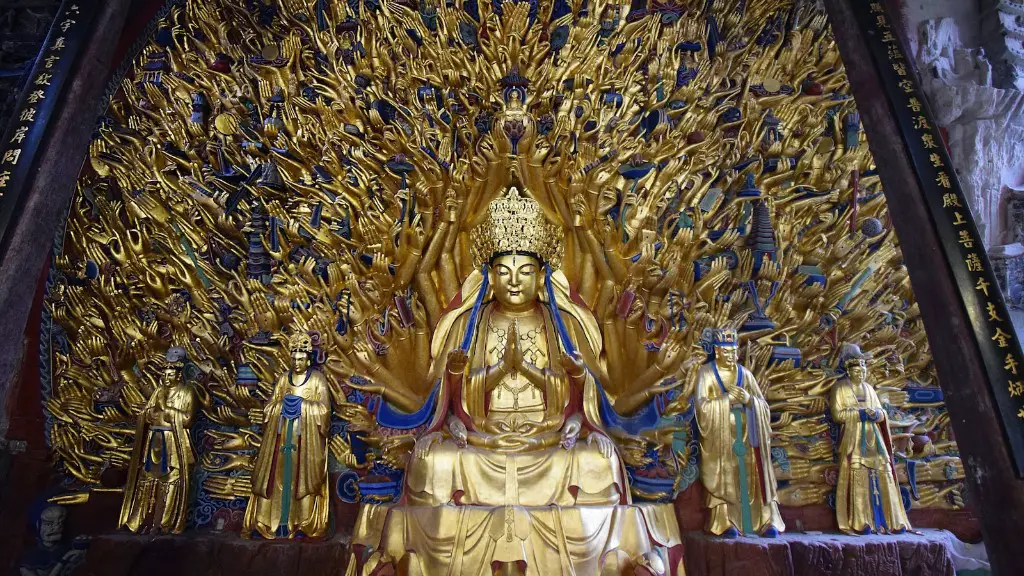Understanding Hinduism and the Worship of God
Hinduism is one of the oldest religions in the world, with its origins in India over five thousand years ago. Hindus worship a single god, Brahman, although this one god is worshipped in many forms. Hindus believe in a cycle of birth, death, and rebirth, and that the actions and choices in this life will determine your fate in the next. Hindus also believe in karma and dharma; karma being the law of cause and effect, and dharma being the code of conduct.
Hindus believe that Brahman is the all-powerful force that permeates and governs the entire universe. They worship this one God in many forms, such as Vishnu, Shiva, Durga, Lakshmi, and more. Worship may take place in a temple, at the home altar, or outdoors. Different gods may be worshipped for different reasons – for example, a family may call on Lakshmi for wealth and abundance, or Shiva for health and protection.
Hindu worship is called ‘puja.’ The puja ceremony includes offerings of flowers, fruit, and incense, as well as chanting and prayers. Water, milk, and honey may be used as a libation, poured over the altar and Shiva linga. Prasad, or blessed food, is sent around the temple or taken home, symbolizing the divinity that is associated with the offering.
In Hinduism, the worship of God is not limited to physical objects or rituals. It also includes worshipping God in nature and within oneself. For example, Hindus may meditate and chant a mantra to commune with Brahman, or create a spiritual image in the mind to focus on. This inward focus on spiritual truths and divine purity is the basis of many Hindu practices.
The aim of Hindu worship is to connect with Brahman, the universal spirit or divine essence, to bring physical and mental balance, enlightenment, and bliss. By connecting with God, Hindus believe that they can become one with the divine and experience peace and serenity. Hindu worship is unique among religions in that it is focused on the individual’s spiritual growth and is not based on any single scripture, creed, or dogma.
Different Types of Hindu Worship
Hindu worship can take many forms, depending on the specific tradition. These include circumambulation, or walking slowly around an object of worship in a clockwise direction, as well as offerings of water, rice, and flowers. Hindus may also practice meditative techniques to still the mind and connect with the divine. Some Hindus may engage the services of a priest or spiritual advisor for specific rituals.
For the worshipper, puja can take the form of chanting mantras or singing devotional songs, repeating prayers, and meditation. In the Vedantic tradition, Hindus may practice japa, or repetitions of a specific mantra, to draw closer to Brahman. In some Hindu traditions, worshippers may engage in a form of yoga to help them connect more deeply with the divine.
Complex rituals such as homams and yagnas are often performed in temples to appease specific gods and obtain specific benefits, such as health and well-being. Worshippers may also perform achamana, or sipping water in the name of a deity to purify the soul.
In addition to the physical and mental practices of Hinduism, many devotees make a commitment to serve others and live in harmony with nature. Hindus believe that service to others is an integral part of worship and that it helps us to cultivate compassion, humility, and generosity. This compassionate attitude is said to be the basis for a meaningful and successful life.
Hindu Rituals and Their Significance
The rituals of Hinduism are closely related to the worship of God. Hindus often wear sacred items of clothing during puja rituals, such as a shawl, scarf, or mala. They may prostrate themselves in a form of prostration known as aasana and perform obeisance to the gods. They may also perform a mudra, or hand gesture, to signify a specific request or intention.
Rituals play an important role in Hinduism as they are believed to help connect with the divine and attain spiritual goals. Hindus may engage in specific rituals to obtain special blessings or rewards, or to seek protection or liberation. The rituals are meant to bring worshippers closer to their chosen deity and develop a deeper understanding of the divine.
The worship of God in Hinduism is often ritualistic, and the rituals may vary from person to person and from region to region. However, rituals are believed to bring the worshipper into a state of connectedness with the divine and to help elevate the mind and soul. This can bring peace, clarity, and joy to everyday life.
The Benefits of Hindu Worship
The benefits of Hindu worship are both spiritual and material. On a spiritual level, it helps develop wisdom and inner peace, leading to increased contentment. On a material level, it is believed that engaging in specific rituals can bring results related to health, wealth, and well-being.
Hinduism is not just about worshipping God; it is also about the interaction between humans and the divine and how to live a meaningful life. Hinduism teaches us to see the divine in all things and to cultivate a sense of devotion and reverence to the divine and to all life.
Hinduism is unique in that there is not one path or one god to be worshipped, but rather many paths and many gods. The aim of Hinduism is not to convert or to be dogmatic, but to increase awareness, develop understanding, and cultivate inner peace.
Symbolism of Worship in Hinduism
Many of the physical performances of Hindu worship are symbolically oriented. For example, when an offering is made to a deity, it is not merely a physical action; it is also a spiritual offering. Similarly, when a mantra is chanted, it is believed to bring a favourable response from the divine.
Symbols are often associated with a particular deity and they carry its energy. For example, the lotus flower is associated with the goddess Lakshmi, symbolizing wealth and prosperity. Similarly, the crescent moon is associated with Goddess Durga and signifies protection. Symbols can also be associated with specific spiritual teachings, such as the yin and yang of Taoism.
By understanding the symbolism of worship, Hindus can gain a deeper understanding of the divine and its relationship to the universe. This understanding can help them to connect more deeply to the sacred and to develop a greater awareness of the divine energies on Earth.
The Role of the Guru in Hindu Worship
In Hinduism the guru, or spiritual guide, plays an important role in the spiritual development of a worshipper. The guru is believed to be a living embodiment of the divine and to possess special knowledge of spiritual teachings. A guru can help their disciples to understand the symbolism of rituals and the intricacies of spiritual practice.
The guru can also provide support and guidance on the path towards ultimate spiritual realization. By having a teacher to guide them, a devotee can learn to develop devotion, concentration, and self-control, and to practice selfless service and service to others. This helps to bring the worshipper closer to Brahman and to the spiritual truths that the religion seeks to impart.
The Symbolic Meaning Behind Puja Ceremony
The rituals of Hinduism are tied to long-standing beliefs and traditions related to the worship of God. The puja ceremony is seen as a form of self-purification, allowing worshippers to cleanse their minds, bodies, and souls in preparation for receiving divine grace. In some traditions, the puja ceremony is seen as an act of devotion or prayer to invoke or thank the gods.
The puja ritual involves offerings of flowers, fruits, and incense, as well as chantings of mantras and prayers. These physical actions symbolize a worshipper’s commitment to their spiritual journey and their desire to seek knowledge and unity with the divine. The offerings are made with the hope that they will be accepted by the gods and provide protection and blessings.
The puja ceremony is also a way for worshippers to connect with one another and to share their spiritual journey. By performing the ritual together, Hindus can build a sense of solidarity and community to support them in their spiritual quest.
The Importance of Auspicious Days in Hindu Worship
Hindus believe that certain days, or muhurtas, are auspicious for performing rituals or engaging in spiritual practices. Auspicious days depend on the lunar calendar and the movements of the planets. On auspicious days, Hindus believe that the energies of the celestial beings are in alignment and are more likely to respond to prayers.
The importance of auspicious days lies in the belief that these days bring faith, energy, and luck to the worshipper. For example, worshippers may perform special rituals, such as homams and yagnas, to appease specific gods, or engage in meditation, chanting, and yoga to increase their connection to the divine.
The rituals performed on auspicious days are believed to bring good luck, prosperity, and protection from harm. By engaging in spiritual practices on auspicious days, Hindus believe that they can support their physical and spiritual lives and attain peace and harmony.



